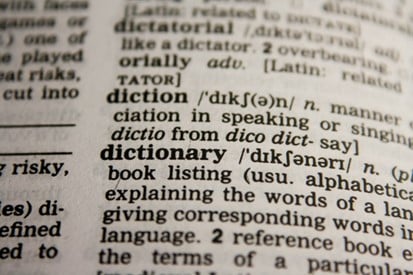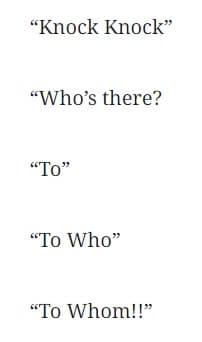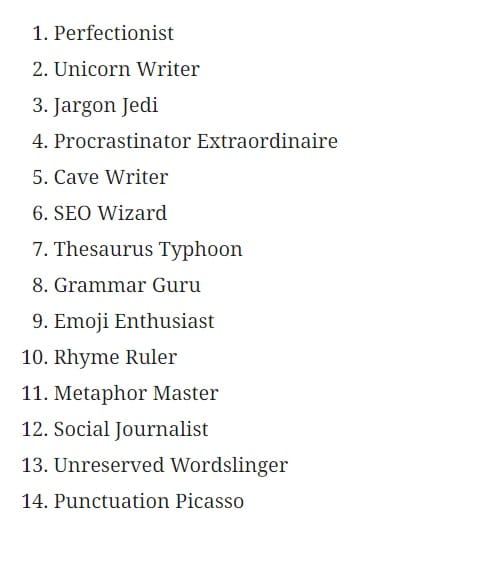The 14 Different Types of Writers
January 2, 2024
In the literary world, there exists many different types of writers with many different personalities, quirks, habits, and skills. These different traits mean there is no shortage of creative diversity in the content produced daily around the world.
While no two writers are cut from exactly the same cloth, many writers share some traits which means there are a few themes to explore in the wonderful world of writer personalities.
In this article, we will take a satirical look at the many weird, eccentric, and wonderful writers who enrich our daily lives.
The 14 Different Types of Writers
1. The Procrastinator Extraordinaire:
Putting things off until the last minute is something many writers can relate to, but the Procrastinator Extraordinaire takes this concept to a new level all together.
Their ideal space is a cozy coffee shop with a notepad full of doodles and exciting ideas.
They spend hours perfecting their Spotify playlist, rearranging their desks, and debating the best angle for that Instagram-worthy espresso picture that will go viral any minute.

As the deadline approaches, and after a dedicated pursuit of learning how to build their own house on YouTube, they quickly channel their inner Hemingway and produce brilliant copy, surprising even themselves with their own pure genius. These procrastinators thrive under pressure and should be left to their own devices.
2. The Cave Writer
When it comes to introversion, the Cave Writer is entirely in a league of their own. Their comfort zone does not extend out much further than the chairs behind their desks.
The Cave Writer’s lack of interest in social interactions makes them the perfect candidate for intricate and complicated writing projects with lots of technical details and deep dive research. Just don’t ask them to call a client. These reclusive revisers have mastered the art of brainstorming to the point where they start leaning into the migraine.
While talking is not something the Cave Writer enjoys, they take their responsibility as ‘plot hole detectives’ very seriously and will quickly point out any inconsistencies in a story line, meaning, their friends usually avoid them like the plague on movie night.
Finally, be careful what types of questions you ask the Cave Writer because instead of the expected yes or no answer, you may be met with a 10,000-word essay explaining why it was never a yes or no question to begin with.
3. The Unreserved Wordslinger
The Unreserved Wordslinger is the exact opposite of the Cave Writer and has yet to discover the limits of their comfort zone. They have countless friends, and they generate their best ideas by talking to others.
These writers don’t enjoy being alone in a dark and dingy room with only their thoughts as amusement. They have refined the art of eavesdropping on conversations in public places and have no problem walking up to people to weigh in on the conversation.
When these extroverts finally sit down to write something, the process can be rather slow and tedious because every new sentence is so groundbreaking that it deserves a celebration or night out with their friends.
Be careful when you befriend the Unreserved Wordslinger because in addition to making a new friend, you may end up as one of the characters in their next masterpiece.
4. The Thesaurus Typhoon
The Thesaurus Typhoon is a walking thesaurus. These writers have never met a synonym they didn’t like.

And, of course, their copy is a linguistic rollercoaster, packed with perplexing polysyllabic words that leave readers scratching their heads.
The thesaurus serves as their constant companion, and, while these writers insist that their writing is 'eloquently erudite,' some people can find it confusing and bizarre.
Nevertheless, the Thesaurus Typhoon is always good to have around during those moments when we have a complete brain shut down and can’t seem to remember the word for those things we wear on our feet when we leave the house, i.e., shoes.
5. The Punctuation Picasso:
The Punctuation Picasso is the writer who has recently discovered the wide and varied applications of punctuation. Every sentence they craft is a masterpiece of commas, dashes, ellipses, and semicolons galore.
One of the Punctuation Picasso’s favorites is undoubtedly the exclamation mark as they have discovered that this upside down ‘i’ can instantly turn any mundane idea into a super-exciting premise!!!!!!!!!!!!!!!!!!!!!!!!!!!!!
They believe that showering punctuation throughout their copy like confetti at a wedding adds that much needed sophistication it so desperately needs, but in reality, readers are left gasping for breath as they drown in a sea of apostrophes, hyphens, and parentheses while the message is completely lost.
These writers often find themselves in the midst of a comma conundrum with sentences like “I went to the store, which, by the way, was really busy, and, I got, like, ten, different items, for dinner.” In addition, they usually have more questions than answers due to their love of the question mark??? One punctuation mark you are unlikely to find in their copy is the period because that signals the end with no more room for punctuation creativity.
6. The SEO Wizard
The SEO Wizard is obsessed with SEO rankings and knows the arcane arts of search engine optimization like the back of their magic hands. They can seamlessly incorporate keywords into any copy and may not realize when they are sacrificing readability for SEO sorcery.
While their copy might rank high on Google, it can leave human readers feeling like they’ve been hexed with all the awkward phrasing. These writers are very gifted, they just need to rein themselves in every once in a while, to avoid writing riddles instead of good quality content.
7. The Metaphor Master
The Metaphor Master sees the world through a dazzling lens of metaphors. For them, everything hides behind a symbol of deep and debatable meaning, and every sentence must be wrapped in a veil of poetic mystery.
While their writing can be enchanting, they can often be mistaken for amateur poets who write complete nonsense such as “His laughter was a rainbow of jigsaw puzzles, piecing together the moon’s forgotten lullabies.”
Reading content written by an overzealous metaphor user can however be a great mental exercise. Readers might find themselves constantly pondering the deeper meaning of every metaphor, which can be both exhausting and hysterical at the same time.
8. The Emoji Enthusiast:
The Emoji Enthusiast has a deep and abiding admiration for emojis. Their copy is a visual feast of smiley faces, thumbs up, and heart-eyes.
While emojis can add a touch of fun and emotion to copy, these writers can sometimes go overboard, leaving their emails looking like Egyptian hieroglyphics.
For the Emoji Enthusiast, emojis form a language in their own right. Armed with an emoji for every mood, these writers can have profound conversations with likeminded emoji admirers using nothing more than these colorful little symbols.

They may also answer a simple question like “What are you doing today?” with just a series of emojis like 🦄🌈🍕🚀, which obviously means, “I will be riding a unicorn over the rainbow while having a slice pizza on my way to outer space.”
9. The Rhyme Ruler:
The Rhyme Ruler is a lyrical wordsmith who can’t resist the urge to make it rhyme, every time. Their copy is like a rap battle, filled with clever wordplay and rhyming couplets.
While this can be entertaining in small doses, a whole marketing campaign that rhymes can leave customers wondering if they’ve stumbled into a Dr. Seuss book.
Because every line they write follows the most exquisite iambic pentameter, they consider their copy pure Shakespearian and, as if producing good content isn’t already tough enough, these linguists are compelled to add that extra layer of complexity to their craft.
An unfortunate weakness of the Rhyme Ruler is to sometimes sacrifice fluency for rhyme, thereby producing utter nonsense like “The purple turtle danced a prance in France with underpants made of trance.”
10. The Grammar Guru:
The Grammar Guru makes the perfect editor/proofreader and is the guardian of the grammatical multiverse. They wield their red pens like a lightsaber, ready to strike down any and all grammatical errors or spelling mistakes.
The problem is that these writers may become overly obsessed with grammatical rules, thereby placing less focus on the nuance of language that is required for great writing.
The Grammar Guru’s favorite punctuation mark is the semicolon because it allows them to pause and reflect on life’s complex sentence structures.
Lastly, while these writers tend to take life and grammar very seriously, they do enjoy the occasional knock knock joke:

11. The Social Journalist
The Social Journalist leaves no stone unturned when doing research and interviewing people to gather the facts for the stories they uncover.

They love the dynamics embedded in social structures and have a deep appreciation for moving human narratives.
While the social journalist is great at getting the heart of the matter, their interest begins and ends in the realm of social interactions.
Technical writing, for instance, is not their forte and asking them to write an RFP may not yield desirable results.
Instead of outlining the project's requirements, The Social Journalist might turn the RFP into a gripping short story with plot twists, complicated characters, and dramatic tensions.
The RFP might start with, “Once upon a time in a land of procurement…”
12. The Jargon Jedi:
The Jargon Jedi is fluent in buzzwords, and industry specific terms and acronyms, and they are not afraid to use them liberally. They love incorporating lengthy acronyms in their copy such as BTDTGTTSAWIO which everyone knows stands for “been there, done that, got the T-shirt and wore it out”.
The Jargon Jedi is typically the student who recently graduated from college, who now, by definition, knows everything. When writing copy, their ultimate goal is to show their readers just how well informed they are, leaving very little room for articles, linking verbs and conjunctions in their sentences.
A good example may be a sentence like, “Synergize proactive, cloud-native, quantum-ready solutions with holistic blockchain decentralization to optimize gamified, AI-driven, cyber-physical platforms, disrupting the hyperloop market for sustainable, crypto-driven zebras.”
13. The Perfectionist
The Perfectionist writer strives to create seemingly perfect copy, every time. Their favorite button on the keyboard is backspace because it just never seems to be good enough.
Working on a group project alongside non-perfectionists is undoubtedly the Perfectionists worst nightmare and can be almost as devasting as realizing that their phone is not fully charged.
These writers often spend their weekends going down an endless rabbit hole of research, editing and revisions to try and to perfect what is already great. They are also great at procrastinating, but only because they love doing things at the right moment.
While it may seem like hard work to be a perfectionist, their high standards leave very little room for mistakes, which ultimately make them a valuable asset as a writer.
14. The Unicorn Writer
The Unicorn Writer is downright remarkable and can do just about anything, even write a user manual for assembling IKEA furniture without going completely insane.
They possess a versatile skill set that allows them to tackle various writing tasks, from crafting poetry that rhymes “orange” with “sporange” (and yes, sporange is a real word) to composing technical documents with the type of precision that leaves even rocket scientists with confused admiration.
These writers can seamlessly adapt to different writing styles and genres, making them as flexible as a yoga instructor at a contortionist convention.
Whether it’s writing a novel, a blog post, a research paper, or a social media update, the Unicorn Writer demonstrates great dexterity and expertise in handling each, and they can do all this while drinking coffee, picking up the kids from school, making dinner, carving pumpkins underwater, skydiving or riding a cloned camel.
Yes, there is in fact nothing the Unicorn Writer can’t do.
Which Type of Writer Are You?
Choose the statement which most accurately describes you:

Answers































